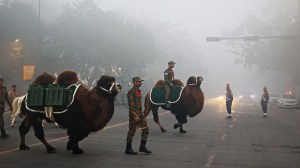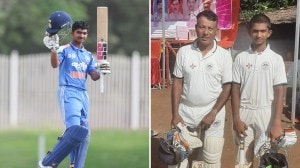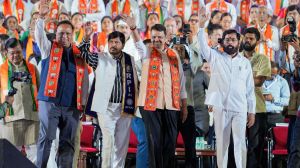Look kiya jaye
Celebrating Slumdog and Qamp;A,which celebrate reality TV
Around 1890,Sigmund Freud threw a red oriental rug on a rather short divan upholstered with springs and horsehair stuffing in his clinic. It was the original couch of confessions,where Anna O and Rat Man revealed themselves in the safety of pseudonyms. Now,the confessional is for the couch potato and the setting is dramatically different. In a television studio,under spotlights,life becomes a game,played for a million dollars. You sit on a swivelling chair opposite Amitabh Bachchan and Computerji and let on your lifes little details,something subjective amid those objective-type questions. America from firefighters and waitresses to NFL players and carpenters happily takes part in The Moment of Truth and answers extremely personal and embarrassing questions. They confess about cheating on their spouses,about lying that the wedding ring is diamond when it is just zirconium and how they still hate their dads and how their moms abandoned them and walk away with a few thousand dollars. Danny Boyles Golden Globe-winning Slumdog Millionaire,an adaptation of Indian diplomat Vikas Swarups novel Q amp; A,taps into this pop-culture phenomenon; reality televisions most cost-effective format where ordinary lives are played out in an episode and advertisements and revenues swell.
Slumdog Millionaire is about a boy from Dharavi who is on the verge of winning the television game show Who Wants to be a Millionaire? The question that troubles the games producers is: how did Jamal in the novel he is Ram Mohammed Thomas,the literary counterpart of Bollywoods Amar Akbar Anthony,but screenplay writer Simon Beaufoy seems to have decided not to complicate things or to give in to the Indian love for metaphors know the answers to all the questions. The novel,and the movie,is the slum boys confession. In explaining how he knew the answer to each question,the story of his life unspools.
Private life becomes a public performance in the coliseum that we now call a television programme. There,a host of nobodies a late politicians son,a TV actors ex-husband,a pretty moll,an item girl walks around with a microphone,flirts and sleeps and finally jumps a wall and becomes prime-time television material. There,out-of-Bollywood Shilpa Shetty bleaches her face,cooks chicken and finally gets to sip tea with the Queen. While columnistas worry about the colour of the studio walls and the worth of the dramatis personae caught between them,the public doesnt seem to bother about their CVs. Voting lines are open and the game has been democratised. Pedigree is of little concern here where ordinary and even the less than ordinary become heroes winners,at least for a season. Here,slumdogs become millionaires.
Q amp; A is nothing new in Thebes where the Sphinx waylaid the travellers,it came with all the existential baggage that the old Greeks couldnt do without. On the new Freudian couches crowding the television studios,however,it is the little fears,little knowledge and little ignorances that are played up between commercial breaks. In The Moment of Truth,it is a lie detector that plays the part of the modern-day Sphinx and decides who wins and who loses. On Indian TV,existentialism does not necessarily fetch TRPs,but Bachchans baritone did,although Shah Rukh Khans pretty waistcoats and playfulness did not. Bachchan turned a quiz show into pop cultures extravaganza,even coined phrases such as Lock kiya jaye that fed into everyones vocabulary. A nation was hooked,minions turned into mini-millionaires and on the side Big B and his bank balance got resurrected.
But even then the show was not about Bachchan. It was about how ordinary lives provide drama when the idiot box became the confession box. Oh,it is schmaltzy; of course,it is powered by voyeurism but watching private lives publicised in pixels is the favourite pastime and the guilty secret of many. Swarups Ram Mohammed Thomas and Boyles Jamal are its mascots in multiplex.
charmy.harikrishnanexpressindia.com
- 01
- 02
- 03
- 04
- 05































